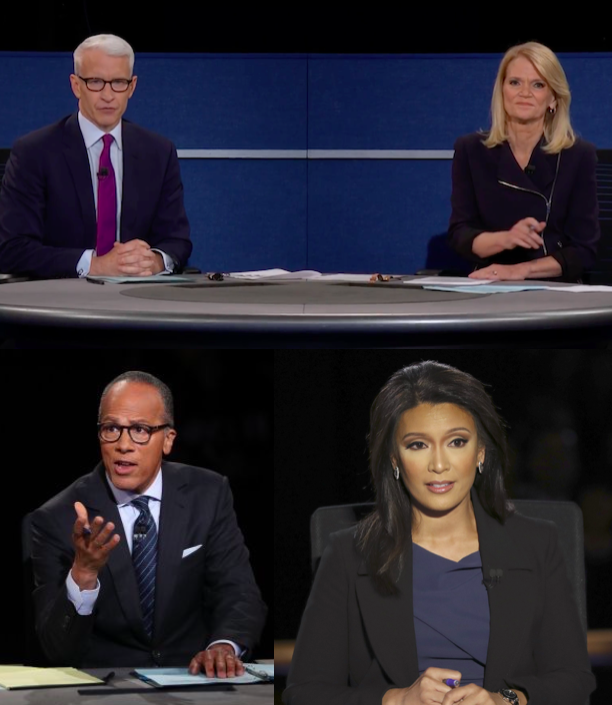By Aviva Rosenberg
Martha Raddatz and Anderson Cooper moderated the second presidential debate at Washington University. The co-moderators were noticeably more forceful than previous moderators have been, asking pointed, provocative questions and following them up if the candidate failed to provide a proper answer.
Donald Trump criticized the moderators onstage, accusing them of biased questioning and time-checking. While his time-checking criticism was unfounded (the candidates got equal speaking time, with Trump speaking 44 seconds longer than Clinton) the accusation of bias is more difficult to dismiss. Trump complained that the debate was “three on one.” The morning after the debate, Fox News published an article titled “St. Louis, Moderators Raddatz, Cooper Interrupt, Talk Over and Even Debate Trump”.
During the last debate, both left- and right-leaning media criticised Lester Holt for being too passive of a moderator, and last night, the right wing media criticized Raddatz and Cooper for steering the conversation too forcefully. Raddatz was specifically criticized for “debating with Trump” about Syria. These criticisms beg the question of what the role of the moderator truly is.
If the role of the moderator is simply to ask unbiased questions and ensure each candidate gets equal amounts of speaking time, then perhaps Cooper and Raddatz overstepped their bounds.
During Raddatz’ exchange with Trump on Aleppo, she countered the candidate repeatedly, demonstrating her knowledge of foreign affairs, and repeated the question when he attempted to dodge answering it. While the moderators’ questions seemed equally aimed at both candidates, with Anderson pressing Trump, “You brag that you have sexually assaulted women. Do you understand that?” and Raddatz bluntly asking Clinton “Is it O.K. for politicians to be two-faced?” the two asked Trump to answer the posed question noticeably more often. If the role of the moderators is simply to ask the question, then Raddatz and Cooper did more than asked for.
However, if the moderators’ job is to ensure that the questions are answered, Cooper and Raddatz exemplified the appropriate level of follow-up. When Trump avoided talking about his comments about sexual assault in favor of talking about ISIS, Cooper steered him back to the question. When Trump’s response concerning Syria did not answer the question, which specified what he would do about humanitarian aid, Raddatz intervened. If the role of the moderator is to make the candidates answer the question, Trump’s comments about biased moderating would be invalid, explained by the fact that he simply avoided questions more often than Clinton, who had direct and thought out answers to each question.
The contentious response to the moderators mimics the contentious nature of this debate, but I think it could be avoided. Unlike the actual debate, this disagreement stems not from opposite viewpoints, but from a fundamental misunderstanding or miscommunication about the job requirements of a moderator. Before the media praises or criticizes the moderators, Washington and the rest of the country need to have an explicit conversation that specifies what the role of the moderators truly is.







